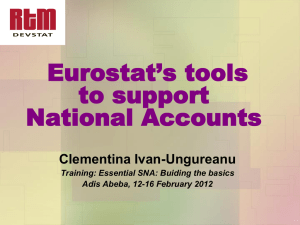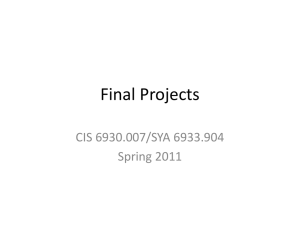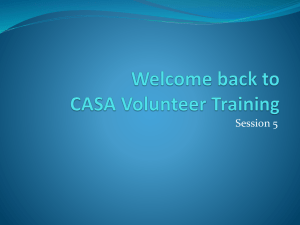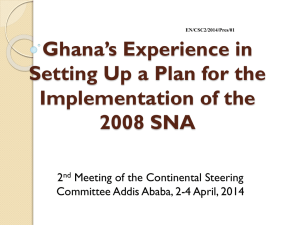Essential SNA - United Nations Statistics Division
advertisement
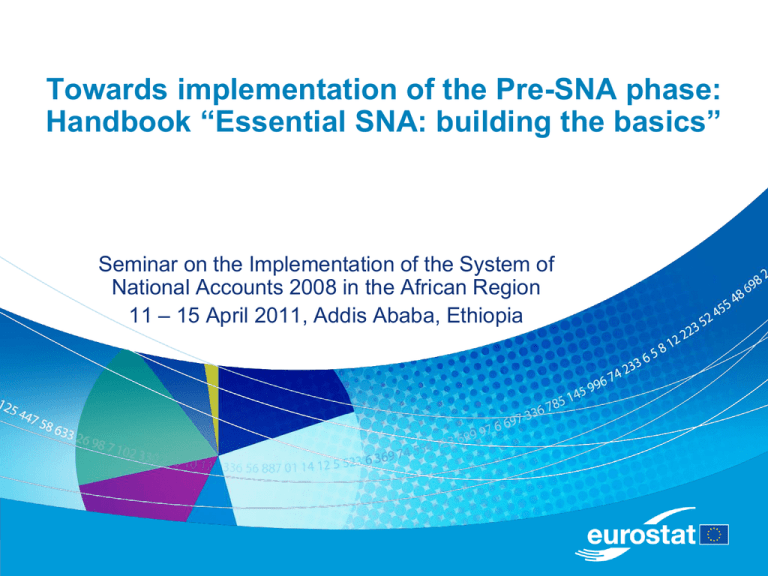
Towards implementation of the Pre-SNA phase: Handbook “Essential SNA: building the basics” Seminar on the Implementation of the System of National Accounts 2008 in the African Region 11 – 15 April 2011, Addis Ababa, Ethiopia The Beginnings: Luxembourg Recommendations, ISWGNA May 2008: Eurostat organised in conjunction with the Statistical Division of the UN, a high-level conference on national accounts in the context of development cooperation which concluded by endorsing the “Luxembourg Recommendations” (LR). LR were then passed on to the Inter-secretariat Working Group on National Accounts (ISWGNA) which in 2009 formulated an Action Plan for implementation of SNA2008 which included improving national statistical systems. One way to achieve such improvements is by providing support focused on the collection and processing of basic source data (IT tools; handbooks & guidelines). IT tools for National Accounts: ERETES: – An IT solution for the yearly compilation of national accounts data – Free of charge and available online http://www.eretes.net/FR/index.htm – EUROSTAT activities for 2009-2012: • Upgrading ERETES to SNA2008* • Support to the ERETES user group • Every year: 4 one-week regional or national workshops ECOTRIM: – An IT solution for the quarterly compilation of national accounts data – Free of charge and available online http://circa.europa.eu/Public/irc/dsis/ecotrim/library Handbook: meeting the needs of SIDS and LCDs At the end of 2007, only 10 per cent of small island developing states (SIDS) and least developed countries (LDCs) were able to provide the seven tables of the minimum requirement data set (MRDS) defined in the report of the ISWGNA to the thirty second session of the Statistical Commission1. Further study undertaken by ISWGNA highlighted the need to strengthen the statistical production process that precedes the integration of the data into national accounts, namely in the collection and processing of basic source data and the institutional context, the so-called Pre-SNA Phase. 1Source: Item 3(e) of the provisional agenda of the fortieth session of the UN Statistical Commission, New York, 24-27 February 2009 Eurostat activities to implement the ISWGNA principles In line with the ISWGNA task of preparing manuals and handbooks Eurostat prepared the Handbook “Essential SNA: building the basics” which focuses on the pre-SNA phase and which became available by the end of 2010. The handbook is based on and is fully compatible with Volumes I and II of SNA 2008. The handbook is particularly relevant for SIDS and LCDs to produce the most essential tables for a "minimal" implementation of SNA. The handbook includes best practices for analysis of basic data to ease the start-up phase of NSOs facing the challenge of producing NA data in accordance with SNA for the first time. Handbook: “Essential SNA: Building the basics” Main reference framework is provided by the Minimum Requirement Data Set (MRDS), developed by the ISWGNA. This is the set of required, recommended and desirable data on national accounts that should be provided by countries intending to implement the SNA for the first time. Key issues for implementing the 2008 SNA presented in the handbook Institutional issues, such as the need to create the legal framework for implementing national accounts and the strategy for developing the statistical system, which forms the basis for the implementation of national accounts; Technical issues relating to statistical infrastructure, such as the business register and classifications; Technical issues relating to statistical and administrative data sources required for compiling national accounts, and especially their use for estimating national accounts indicators; Specific issues for the compilation of national accounts, common in developing countries, such as the non-observed economy and the informal sector. Structure of the Handbook The handbook has been divided into several chapters, each focusing on a key issue. At the end of each chapter is a list of references to other manuals and documents to provide guidance for users interested in further developing the topics covered by the handbook. Chapter II. System of National accounts Offers a short introduction to the national accounts system, and in particular the 2008 SNA; Provides arguments for implementing national accounts, providing Chief Statisticians with the tools for justifying the need to allocate human and financial resources to this activity; Presents the definition and characteristics of the national accounts system as well as how it may be used in the economy; One section is devoted to the new SNA: it includes a brief history of SNA developments and the main improvements in the 2008 SNA with respect to previous versions. Chapter III. Building the SNA Presents the guidelines for drafting a national strategy for implementing the SNA and compiling national accounts, these can be adapted to the specific situation in each country; Presents the main phases of the SNA implementation strategy: Establishment of the appropriate institutional environment (including organizational, human resources and management approaches); Inventory of data sources; Collection, analysis and translation of indicators into national account concepts. Chapter IV. Basic concepts Introduces the concepts used in the 2008 SNA; Outlines who the stakeholders in an economy are and how they are grouped; Outlines the kind of actions the stakeholders undertake; Presents the main aggregates of the SNA; Introduces users to the main results that national accounts provide. Chapter V. Statistical infrastructure for national accounts Outlines the main pillars needed for compiling national accounts: Statistical Business Register; Classifications such as the International Standard Industrial Classification of All Economic Activities (ISIC Rev. 4); Statistical data sources (census, survey), broken down according to main domains; Administrative data, broken down according to main domains. Chapter VI. The Informal Sector Provides general guidelines for identifying and assessing the informal sector; Looks at the informal sector vis-à-vis the non-observed and observed economies, defining and presenting the criteria used to identify the informal sector, the measurement methods to be adapted to country specificities and the most relevant statistical surveys used for estimating it. The way forward: ongoing and future Eurostat activities related to the Handbook Focuses on methodological support and tools in the context of cooperation. Activities foreseen for 2011 – 2013: Create a forum for users. Spread its usability : (by preparing French and Spanish versions, a wiki version and an E-Learning module). Give support to users of the handbook (including methodological helpdesk support to users and including the publication of methodological papers). Internationally promote and encourage the knowledge transfer of the handbook. Update the handbook “Essential SNA: building the basics” based on the users feedback. Online Forum on the Handbook User feedback related to the Handbook: – Questions; – Debates on a specific topic; – Suggestions for improvement related to the handbook. Posting of methodological papers (1 per month for 3 years, on topics related to the handbook). E-Learning Tool Based on the “Kangaré – Introduction to National accounts” toolkit. Will be more interactive and will be available online. Foreseen contents: – User friendly interface allowing the trainee to go through the training; – Real case examples of best practices for analysis of data to supplement the training activity; – A set of exercises and their solutions; – An interactive glossary. ISI “Short course” 3 day course back-to-back with International Statistical Institute, Dublin, Ireland, August 2011. Focused on the “Essential SNA” Handbook. Open to heads of national accounts departments and offices, plus young statisticians. Target: Countries in “Milestone 0 to 2” of SNA implementation. Thank you for your attention Amerigo LIOTTI Eurostat, European Commission Unit D2-International Statistical Cooperation Tel (+352) 4301-32095 - Fax : 4301-32769 amerigo.liotti@ec.europa.eu

